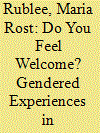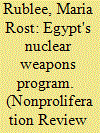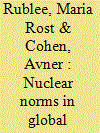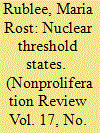|
|
|
Sort Order |
|
|
|
Items / Page
|
|
|
|
|
|
|
| Srl | Item |
| 1 |
ID:
171811


|
|
|
|
|
| Summary/Abstract |
Unlike in the broader field of international relations, relatively little research on gender representation and gendered experiences exists within the subfield of security studies. This article begins to fill that gap by sharing the results of a 2019 survey of members of the International Security Studies Section (ISSS) of the International Studies Association (ISA). The survey results show striking gender differences in members’ experiences, with women more likely than men to describe ISSS as “insular,” “clubby,” and an “Old Boys’ Network”; more likely to report experiences of hostility and exclusion; and more likely to believe that diversity initiatives are needed. Our analysis reveals that women in the ISSS report (1) harassment, (2) negative experiences participating in various section activities, (3) more significant barriers to attending and being selected for the section's ISA program, and (4) a sense of feeling unwelcome at ISSS meetings, all at higher rates than male respondents.
|
|
|
|
|
|
|
|
|
|
|
|
|
|
|
|
| 2 |
ID:
076717


|
|
|
|
|
| Publication |
2006.
|
| Summary/Abstract |
The Egyptian nuclear weapons program - started in 1960 and closed by 1973 - can lend insights into today's potential proliferators. First, a number of signs indicating that Cairo was pursing a nuclear option were present, giving us insight into what type of signs we might see from countries seeking nuclear weapons today. While indicators do not necessarily connote intent, my research shows that in the Egyptian case, these signs were indeed warnings that Cairo was seeking a military nuclear capability. Second, a number of external and internal factors combined to shut down the nuclear program, and fortunately, some of these external factors are still applicable today, giving us potential tools to use in persuading other states to forgo nuclear weapons.
|
|
|
|
|
|
|
|
|
|
|
|
|
|
|
|
| 3 |
ID:
158671


|
|
|
|
|
| Summary/Abstract |
We argue that the framework of norms has generated a progressive research agenda in the field of global nuclear politics, providing important insights that traditional realist and materialist analyses ignore or dismiss. These insights are not on the margins of nuclear politics; rather, they answer central questions about nuclear non-use, possession, and the nonproliferation regime at large. These findings are not a fluke; instead, they stem from the powerful analytical framework of norms, which provides complexes of linked propositions about actor expectations and behavior in global nuclear politics. This article examines three of those propositions: the importance of the logic of appropriateness, the role of norm contestation, and the changes brought about by norm entrepreneurs. Finally, we identify other norms-related ideas that can further illuminate the dire policy crises facing global nuclear governance, as well as specific areas of nuclear politics that would benefit from norms-related scrutiny.
|
|
|
|
|
|
|
|
|
|
|
|
|
|
|
|
| 4 |
ID:
093559


|
|
|
|
|
| Publication |
2010.
|
| Summary/Abstract |
"Nuclear threshold states"-those that have chosen nuclear restraint despite having significant nuclear capabilities-seem like the perfect partners for the reinvigorated drive toward global nuclear disarmament. Having chosen nuclear restraint, threshold states may embrace disarmament as a way to guarantee the viability of their choice (which may be impossible in a proliferating world). Supporting disarmament efforts affirms their restraint, both self-congratulating and self-fulfilling. Additionally, the commitment to their non-nuclear status springs at least in part from a moral stance against nuclear weapons that lends itself to energetic support of global disarmament. However, threshold states also offer significant challenges to the movement for nuclear weapons elimination, in particular in relation to acquisition of enrichment and reprocessing facilities. This article analyzes both the challenges and opportunities posed by threshold states by examining the cases of Brazil and Japan.
|
|
|
|
|
|
|
|
|
|
|
|
|
|
|
|
| 5 |
ID:
083656


|
|
|
|
|
| Publication |
2008.
|
| Summary/Abstract |
Since the Nuclear Nonproliferation Treaty (NPT) came into force almost 40 years ago, only four states have acquired nuclear weapons. What accounts for such near-universal compliance? This paper argues that social psychology can help us understand the puzzle of nuclear restraint in two ways. First, nuclear forbearance should be unpacked into three outcomes: persuasion (behavior resulting from genuine transformation of preferences), social conformity (behavior resulting from the desire to maximize social benefits and/or minimize social costs, without a change in underlying preferences), and identification (behavior resulting from the desire or habit of following the actions of an important other). Second, through social psychology, we can specify the mechanisms by which the norm of nonproliferation has influenced policymakers. Indeed, the case of Japan shows that both these contributions help us better understand nuclear decision-making and offer larger insights into regime compliance more generally.
|
|
|
|
|
|
|
|
|
|
|
|
|
|
|
|
| 6 |
ID:
185992


|
|
|
|
|
| Summary/Abstract |
The most inclusive security treaty in the world, the Treaty on the Non-Proliferation of Nuclear Weapons (NPT) turned 50 in 2020. Our special issue takes stock of the NPT’s vitality after these five decades. In this introduction, we emphasize the need to distinguish between the treaty instrument and the larger nuclear nonproliferation regime. Next, we consider a recent development that may represent a serious impending shock which could weaken the NPT: dramatic changes in the treaty’s legal and normative landscape. Then, we assess vitality of the NPT in light of current concerns, arguing that norm contestation can be healthy for international regimes and calls for the death of the NPT are premature. Finally, we review the contributions of our special issue authors, highlighting the significant differences among them, and embedding them in ongoing research on the NPT.
|
|
|
|
|
|
|
|
|
|
|
|
|
|
|
|
|
|
|
|
|